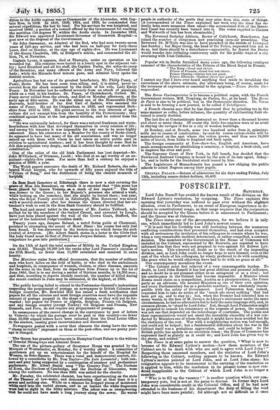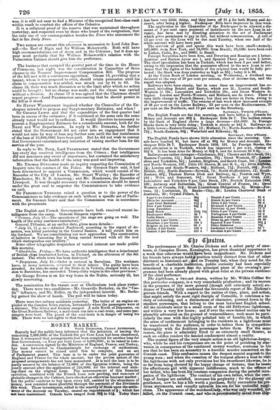POSTSCRIPT.
SATURDAY.
Lord John Russell has avoided the known result of the division on Sir Edward Lytton's resolution, by resigning. The Times explains this morning that yesterday was suffered to pass over without the slightest allusion, even in Parliament, to an event of European importance in de- ference to constitutional usage, as that usage requires that the resignation should be accepted by the Queen before it is announced to Parliament ; and the Queen was at Osborne.
The Times states one of the circumstances, for we believe it is only one, which immediately led to Lord John's newest course. " It is said that his Lordship was still hesitating between the numerous conflicting considerations that presented themselves, and bad even accepted with all seriousness the invitation of his colleagues to remain where he was, when a very remarkable incident determined, or rather compelled, a contrary decision. The members of the Government in the House of Commons not included in the Cabinet, represented by Mr. Bouverie, are reported to have informed him that they were not prepared to vote against Sir Bulwer Lyt- ton's motion. This removed all doubt as to the result of the impending division, and, as Lord John could no longer hope to save himself, even at the cost of the whole of his colleagues, he wisely preferred to do with something like grace what he would otherwise have had to do with no grace at all."
Our contemporary moralizes the event.
"The Cabinet must feel relieved of a very unmanageable burden. No doubt, in Lord John Russell it has lost great abilities and personal influence, and no doubt he is not pleasant either as an antagonist or as a rival ; but his continuance in the Cabinet had become impossible. A Minister whom Russia could claim as a sympathizer, Austria as a plenipotentiary, the Peace party as an advocate, the seceded Ministers as one of their own opinions, and every Parliamentary foe as a probable auxiliary, was absolutely incom- patible with the safety of Government. Lord Palmerston had, indeed, requested him to take no notice of the much ado about nothing' that had been got up, and to stay in ; but, when the Premier had tolerated him so many weeks, in the face of M. Drouyn de Lhuys's retirement under the same circumstances, he had no alternative but to hold the same language still, and, in common phrase, to stand by Lord John.' But, though Lord Palmerston might be prepared to consult his consistency at the expense of power, the occasion was not one that depended on the interchange of courtesies. The public and their representatives would not stand the incredible absurdity of a war con- ducted by Ministers one of whom thought it might have been avoided but for the obstinacy of the rest. War with a neighbouring nation was bad enough, and could not be helped ; but a fundamental difference about the war in the Cabinet itself was a gratuitous aggravation, and could be helped. So the British public has spoken in no uncertain tones ; the House of Commons has expressed itself as plainly as it could do; and Lord John has given way to the storm, and retired." The Times is at some pains to answer the question, "What is now to become of Sir Edward Lytton's motion—how those members of the Cabinet are to be dealt with who are said to agree with Lord John ? " Respecting those unnamed members, and the statistics of Lord John's following in the Cabinet, nothing appears to be known. Sir Edward Lytton's motion pointed at Lord John, and at Lord John alone : his resignation appears to he tantamount to the carrying of the resolution as it applied to him, while the resolution in its present terms is now ren- dered inapplicable to the Cabinet of which Lord John is no longer a member. " Who is to fill up the vacancy ? " is another question which our con- temporary puts, but is not at the pains to discuss. In former days Lord John won considerable credit in the Colonial Offioo, and if he had now attended to the business of his department the duty of filling the void might have been more painful; for although not so difficult as it once
was, it is still not easy to find a Minister of the recognized first-class rank within reach to conduct the affairs of the Colonies.
It is a collateral proof of the reserve that was maintained throughout yesterday, and respected even by those who heard of the resignation, that the only one of our contemporaries besides the Times who announces the fact is the Daily News. .
Two names are current this afternoon in succession to Lord John Rus- sell—the Earl of Elgin and Sir William Molesworth. Both will have high recommendations out of doors and in the Colonies ; but it does ap- pear most probable that Sir William Molesworth's relation with the Palmerston Cabinet should give him the preference.



























 Previous page
Previous page